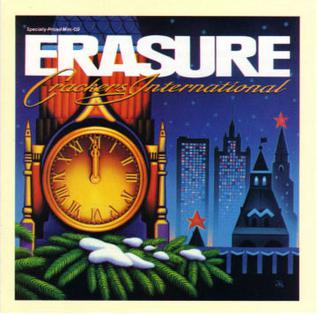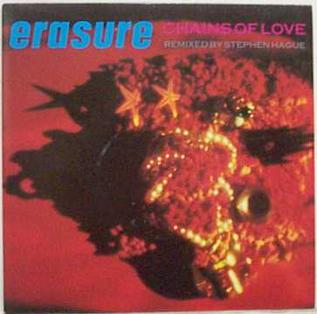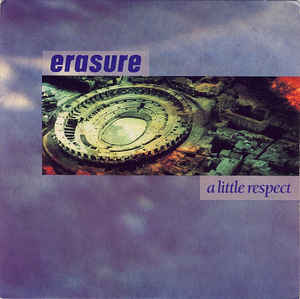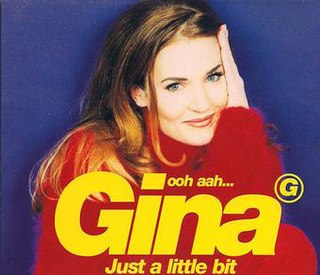
Chorus is the fifth studio album by English synth-pop duo Erasure, released on 14 October 1991 by Mute Records in Germany and the UK and on 15 October 1991 by Sire/Reprise Records in the United States. In 1999, Ned Raggett ranked the album at number 45 in his list of "The Top 136 or So Albums of the Nineties".

Crackers International is a Christmas EP released by English synth-pop duo Erasure in November 1988, in between the albums The Innocents (1988) and Wild! (1989). The EP reached number-one in Denmark and Argentina, and peaked at number two in the United Kingdom and Ireland.

"Number 1" is a song by English electronic music duo Goldfrapp from their third studio album, Supernature (2005). Written and produced by Alison Goldfrapp and Will Gregory, the song features a synthesiser and bass guitar arrangement and was written about the importance and meaningfulness that somebody shares with another, despite that it might not necessarily last.

"Ride a White Horse" is a song by English electronic music duo Goldfrapp. The song was written by Alison Goldfrapp, Will Gregory and Nick Batt for Goldfrapp's third album Supernature (2005). The song was inspired by the disco era nightclub Studio 54.

"Chains of Love" is a song by English synth-pop duo Erasure, released in May 1988 as their ninth single overall. It was written by Vince Clarke and Andy Bell, and released by Mute Records as the second single from Erasure's third studio album, The Innocents (1988). In the United States, Sire Records released it as the first single. The chorus is memorable for Bell's use of falsetto. The album version was produced by Stephen Hague and was slightly remixed for its single release. The accompanying music video featured Clarke and Bell performing the song while being hoisted through the air by thick, metal chains.

"A Little Respect" is a song written and recorded by English synth-pop duo Erasure, released in September 1988 by Mute. It was written by Vince Clarke and Andy Bell. The lyrics are a plea to a lover to show compassion and respect. The heavily synthesized instrumentation is accentuated by acoustic guitar and Bell's vocal falsetto in the chorus. It was their tenth single and was taken from their third studio album, The Innocents (1988). Known as one of their signature songs, the single reached number four on the UK Singles Chart and was Erasure's second consecutive top-20 hit on the US Billboard Hot 100, where it made number 14, and reached number two on the US Billboard Dance Club Play chart.

"Drama!" is the first single released from English synth-pop duo Erasure's fourth studio album, Wild! (1989). Written by Vince Clarke and Andy Bell, the song begins with a low-key keyboard line and a subdued vocal from Bell. As the song progresses, the instrumentation and vocals become more hectic, ultimately ending as a full-blown dance track. "Drama!" contains a "Guilty!" exclamation throughout, provided by Scottish band the Jesus and Mary Chain, who were recording in the studio next door. The song was met with critical acclaim from both music critics and fans.

"Blue Savannah" is a song by English synth-pop duo Erasure from their fourth studio album, Wild! (1989). Written by members Vince Clarke and Andy Bell, the song was released as a single in Japan on 25 January 1990 and was issued in the United Kingdom the following month. Alfa Records released it in Japan as the album's lead single, Mute Records released it in Europe as the album's third single, and Sire Records released it in the United States as the album's second single. Considered one of the band's signature songs, the duo still perform it regularly in concerts. It has been described as an uplifting love song; the instrumentation is crisp and heavily synthesized, accented with sweeping, programmed piano.

"Chorus" is a song by English synth-pop duo Erasure, released in June 1991 as the first single from their fifth studio album of the same name (1991). Produced by Martyn Phillips and written by Erasure members Vince Clarke and Andy Bell, the song features Clarke's electronic soundscapes and Phillips' computerised production. The single was released by Mute Records in the United Kingdom and Sire Records in the United States. It peaked at number three in both Denmark and the UK while reaching number four in Ireland. In the US, it peaked at number 83 on the Billboard Hot 100 and number four on the Billboard Modern Rock Tracks chart.

"Am I Right?" is a song by English synth-pop duo Erasure, released in November 1991 in Europe and Canada as the third single from their fifth studio album, Chorus (1991). Written by Erasure members Vince Clarke and Andy Bell, the ballad peaked at number 15 on the UK Singles Chart.

"Breath of Life" is a song by English synth-pop duo Erasure, released as the fourth and final single from their fifth studio album, Chorus (1991), in March 1992. It was written by Erasure members Vince Clarke and Andy Bell with additional input from Pat O'Brien. An uptempo synth-pop song, its dance music elements were strongly accentuated for the club remixes. For the single release, it was remixed slightly, including a shortened intro. In the United States, it was the third single released from the album.

"Always" is a song by English synth-pop duo Erasure. The ballad was released on 11 April 1994 as the first single from their sixth studio album, I Say I Say I Say (1994). Written by Erasure members Vince Clarke and Andy Bell, it was produced by Martyn Ware. Mute Records issued the single in the United Kingdom, and Elektra Records released it in the United States.

"Run to the Sun" is a song by English synth-pop duo Erasure, released in July 1994 by Mute and Elektra as the second single from the duo's sixth studio album, I Say I Say I Say (1994). The song is written by Vince Clarke with fellow Erasure member Andy Bell and is an uptempo dance music track that displays signature synthesizer programming by Clarke. The UK 7-inch single of "Run to the Sun" was issued on yellow-coloured vinyl and featured a fold-out poster of the single's cover artwork. The single's B-side, a ballad entitled "Tenderest Moments", was later re-recorded by Erasure in an acoustic version for their 2006 album Union Street.

"I Love Saturday" is a song by English synth-pop duo Erasure, released as the third single from their sixth studio album, I Say I Say I Say (1994), on 18 November 1994 in Japan. The track was written by Vince Clarke and Andy Bell, and produced by Martyn Ware. In the United Kingdom, Mute credited the first CD single as the I Love Saturday EP, which contains several new tracks; it was released on 21 November 1994.

"In My Arms" is a synth-pop ballad by English duo Erasure. Written by Vince Clarke and Andy Bell, the song was released in 1997, as the lead single from their album Cowboy. The album version was released as the single version in both the UK and the US, and the lead synthesizer melody performed during the song's middle eight section was mixed lower for the American version. It was issued by Mute Records in the UK and by Maverick Records in the US. The cover for the US single release was used as an example in the book The 7 Essentials of Graphic Design by Allison Goodman.

"Don't Say Your Love Is Killing Me" is a song by English synth-pop duo Erasure, released as the second single from their eighth studio album, Cowboy (1997). It is an uptempo dance music song written by Vince Clarke and Andy Bell. Mute Records issued the single in the UK. For the song's release in the United States, Maverick Records requested a remix for radio. The US single version of "Don't Say Your Love Is Killing Me" is different from what is on the Cowboy album; the song's intro was changed, as well as the middle eight section. An entire verse, edited out of the album version, is restored on the American single release.

"Breathe" is a song by English synth-pop duo Erasure. It was released by Mute Records in the UK and the US as the first single from the band's 11th studio album, Nightbird (2005). Written and produced by Erasure members Vince Clarke and Andy Bell, the song was remixed slightly for its radio version. The UK CD single includes CD-ROM information that allowed buyers to download the Digipro software package and use isolated musical tracks of "Breathe" to create their own remixes. For a short time, fans were able to upload their finished "Breathe" remixes to Erasure's website to share with others.

"I Love You Always Forever" is the debut single by Welsh singer Donna Lewis from her debut album, Now in a Minute (1996). Written by Lewis and produced by Lewis and Kevin Killen, it was released as the album's lead single in the United States on 16 April 1996 and in the United Kingdom on 26 August 1996. The song is inspired by H. E. Bates' novel Love for Lydia, from which the chorus is taken.

"Love Today" is the second single released by London-based singer Mika, taken from his debut studio album, Life in Cartoon Motion (2007). The song was produced by Greg Wells at Rocket Carousel studios and engineered by Drew Pearson. It was released in the United Kingdom on 16 April 2007 as a digital download, with the official physical release appearing on 23 April 2007, and peaked at number six on the UK Singles Chart. The single was released in Australia on 23 July 2007, reaching number three on the ARIA Singles Chart, and was used for Austereo radio station network advertising. The song was nominated for a Grammy for Best Dance Recording at the 50th Grammy Awards but lost to Justin Timberlake's "LoveStoned/I Think She Knows".

"Ooh Aah... Just a Little Bit" is the debut solo single of Australian singer Gina G. The song was written by British songwriters Simon Tauber and Steve Rodway, and released on 25 March 1996 as the first single from her debut album, Fresh! (1997). The song was the United Kingdom's entry in the Eurovision Song Contest 1996, held in Oslo, Norway, where it finished in eighth place. The single topped the UK Singles Chart in May 1996, peaked at No. 12 on the US Billboard Hot 100, and was nominated for Best Dance Recording at the 40th Annual Grammy Awards in 1998.




















